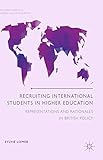Recruiting International Students in Higher Education [electronic resource] : Representations and Rationales in British Policy / by Sylvie Lomer.
Material type: TextSeries: Palgrave Studies in Global Higher EducationPublisher: Cham : Springer International Publishing : Imprint: Palgrave Macmillan, 2017Description: XIII, 268 p. 10 illus. online resourceContent type: text Media type: computer Carrier type: online resourceISBN: 9783319510736Subject(s): Education | International education | Comparative education | Educational policy | ducation and state | Educational sociology | Higher education | Education and sociology | Sociology, Educational | Education and state | Education | International and Comparative Education | Higher Education | Educational Policy and Politics | Sociology of Education | Education Policy | Sociology of EducationAdditional physical formats: Printed edition:: No titleDDC classification: 370.116 | 370.9 LOC classification: LB43Online resources: e-book Full-text access
TextSeries: Palgrave Studies in Global Higher EducationPublisher: Cham : Springer International Publishing : Imprint: Palgrave Macmillan, 2017Description: XIII, 268 p. 10 illus. online resourceContent type: text Media type: computer Carrier type: online resourceISBN: 9783319510736Subject(s): Education | International education | Comparative education | Educational policy | ducation and state | Educational sociology | Higher education | Education and sociology | Sociology, Educational | Education and state | Education | International and Comparative Education | Higher Education | Educational Policy and Politics | Sociology of Education | Education Policy | Sociology of EducationAdditional physical formats: Printed edition:: No titleDDC classification: 370.116 | 370.9 LOC classification: LB43Online resources: e-book Full-text access | Item type | Current library | Collection | Call number | Copy number | Status | Notes | Date due | Barcode |
|---|---|---|---|---|---|---|---|---|
| E-Books | MEF eKitap Kütüphanesi | Springer Nature | LB43 (Browse shelf (Opens below)) | Available | NATURE | 1420008-1001 |
PART I -- Chapter 1. Introduction -- Chapter 2. International Higher Education Discourses -- Chapter 3. International Student Policy in the UK -- Chapter 4. Putting Discourse Theory into Practice -- PART II -- Chapter 5. Influence: A Political Rationale and International Alumni as Ambassadors -- Chapter 6. Reputation: A Hybrid Educational-Commercial Rationale and Students as Consumers -- Chapter 7. Income: An Economic Rationale and International Students as Economic Contributors -- Chapter 98 Immigration: A Rationale Against International Student Recruitment -- Chapter 9. Conclusion.
This book offers a comprehensive overview and critical analysis of the UK's policy on recruiting international students. In a global context of international education policy, it examines changes from New Labour policies under Tony Blair's Prime Minister's Initiative, to the more recent Coalition and Conservative Government policies in the International Education Strategy. The research uses a text-based approach to primary research, adopting a critical framework developed by Carol Bacchi ('what is the problem represented to be'?). The book argues that international student policy can be reduced to reasons for and against recruiting international students; in doing so, students are represented as ambassadors for the UK or tools in its public diplomacy, consumers and generators of reputation, means to get money, and as migrants of questionable legitimacy. These homogenizing representations have the potential to shape international education, implicating academics as agents of policy, and infringing on students' self-formation. The book will be compelling reading for students and researchers in the fields of education and sociology, as well as those interested in education policy-making.
5
